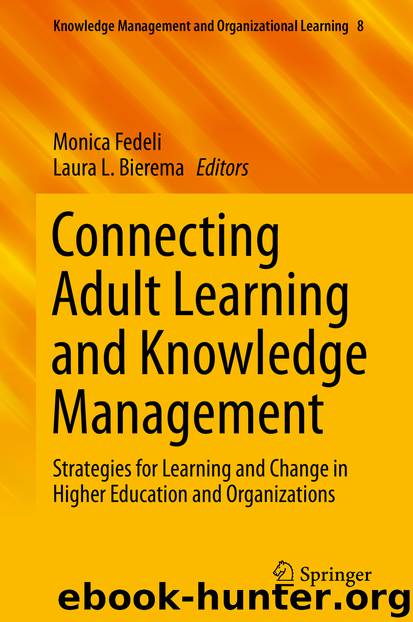Connecting Adult Learning and Knowledge Management by Monica Fedeli & Laura L. Bierema

Author:Monica Fedeli & Laura L. Bierema
Language: eng
Format: epub
ISBN: 9783030298722
Publisher: Springer International Publishing
In their discussion of knowledge management in global organizations, Moitra and Kumar (2007) noted that it is not enough to have useful technologies and practices. It is also essential to be conscious about how adults with various national and ethnic backgrounds learn and share knowledge. Organizations should think about how to create knowledge management systems that are flexible and adaptable based on adult learning principles. According to the authors, one of the ways to create those effective knowledge management systems can be achieved through a “managed socialization.” Managed socialization is about developing platforms that will encourage communication and knowledge sharing among all employees. Vij and Farooq (2015) also emphasize the role of communities of practice within the organization to achieve knowledge sharing among employees and to stimulate continuous learning. Communities of practice are defined as informal groups of people who share their knowledge and opinions through various ways such as storytelling, lunch and learn sessions, seminars, and workshops (Tyagi, Cai, Yang, & Chambers, 2015). According to Nathan (2008), interactive online platforms and blogs can also enable knowledge generation and exchange in organizations with employees working in various countries separated by time and distance. However, having the necessary skills to use those technologies and be involved in virtual learning is equally important.
Teaching for globalization should be both an antecedent and an outcome of knowledge management systems in organizations working in global environments. Ways to design knowledge management systems should be a part of the toolbox of HRD practitioners, organizational leaders, consultants, educators, and all other responsible parties who want to contribute to the well-being of their organizations. Bringing a global systems thinking approach to knowledge management will allow individuals and organizations to learn, thrive, and stay competitive in the rapidly changing global environment.
Download
This site does not store any files on its server. We only index and link to content provided by other sites. Please contact the content providers to delete copyright contents if any and email us, we'll remove relevant links or contents immediately.
Hit Refresh by Satya Nadella(9122)
The Compound Effect by Darren Hardy(8941)
Change Your Questions, Change Your Life by Marilee Adams(7756)
Nudge - Improving Decisions about Health, Wealth, and Happiness by Thaler Sunstein(7689)
The Black Swan by Nassim Nicholas Taleb(7105)
Deep Work by Cal Newport(7063)
Rich Dad Poor Dad by Robert T. Kiyosaki(6603)
Daring Greatly by Brene Brown(6501)
Principles: Life and Work by Ray Dalio(6415)
Playing to Win_ How Strategy Really Works by A.G. Lafley & Roger L. Martin(6225)
Man-made Catastrophes and Risk Information Concealment by Dmitry Chernov & Didier Sornette(6002)
Big Magic: Creative Living Beyond Fear by Elizabeth Gilbert(5753)
Digital Minimalism by Cal Newport;(5747)
The Myth of the Strong Leader by Archie Brown(5496)
The Slight Edge by Jeff Olson(5410)
Discipline Equals Freedom by Jocko Willink(5378)
The Motivation Myth by Jeff Haden(5203)
The Laws of Human Nature by Robert Greene(5170)
Stone's Rules by Roger Stone(5080)
